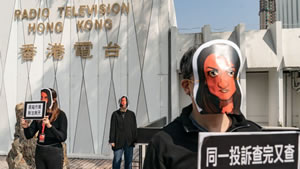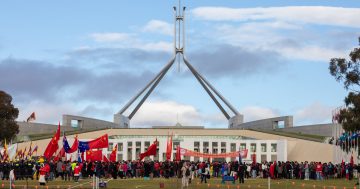 The crackdown on dissent in Hong Kong has raised fears for the independence of Radio Television Hong Kong (RTHK), the city’s only public broadcaster.
The crackdown on dissent in Hong Kong has raised fears for the independence of Radio Television Hong Kong (RTHK), the city’s only public broadcaster.
Critically acclaimed, RTHK was founded in 1928 when Hong Kong was still under British rule.
It has its editorial independence guaranteed in a charter and is often called Hong Kong’s version of the British Broadcasting Corporation (BBC).
However, things are changing quickly.
News programs are being pulled at the last minute, senior staff are quitting in quick succession and journalist, Nabele Qoser, who became a household name for grilling Hong Kong Chief Executive, Carrie Lam was fired, despite protests from her colleagues (pictured).
Now Ms Lam receives extensive air time whenever she requests it to promote Beijing-imposed electoral changes that could reduce the number of directly elected lawmakers.
The head of the station, a respected journalist, was ‘released’ six months ahead of his contract and replaced with Patrick Li, a career bureaucrat with no media experience.
“The world has been turned upside down,” one RTHK journalist who wished to stay anonymous for fear of reprisals said, adding that the newsroom “used to be open and free”.
The journalist said there was no transparency over editorial decisions, meaning that front-line staff had little idea why certain programs were taken off the schedule, or why production was halted on others.
“When making editorial decisions, it needs a lot of discussion; it shouldn’t just be an order from above,” the journalist said.
“Now, everything is decided by [Mr Li]. Is his decision absolutely right and unchallengeable?” they said.
Pro-Beijing lawmakers and supporters have welcomed the latest changes, saying that RTHK’s news coverage had been biased and its editorial freedom should not be absolute.
Cheung Chor-yung, who teaches politics at the City University of Hong Kong, said the charter which guarantees RTHK’s editorial independence was “flimsy” protection in the face of authorities determined to impose the Beijing line.
Hong Kong, 30 May 2021



